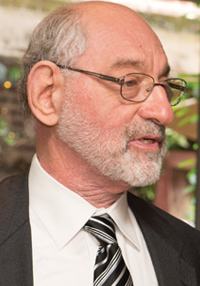 |
John Aunins, PhD view bio | back to agenda
Executive Vice President of Bioprocess & Manufacturing and the Chief Technology Officer, Seres Therapeutics, Inc.
Bioprocessing for Vaccine Viruses and Vectors
Bioprocessing for virus-based vaccines is complex, requiring optimization of not only cellular growth and physiology, but also growth of a parasitic virus on that cellular host. Virus processing has undergone several evolutionary periods from the 1960Õs through to today, and effective processes are ever more important to biotechnology as non-vaccine products such as gene therapy vectors and vectors for transduction of cellular therapies are causing a resurgence of interest in the field. This lecture will discuss current and future challenges in virus production. |
 |
 |
Dan Barouch, MD, PhD view bio | back to agenda
Professor of Medicine, Harvard Medical School
Director, Center for Virology and Vaccine Research, Beth Israel Deaconess Medical Center
A Tale of Two Viruses: HIV and ZIKV
Preclinical and clinical development strategies for two contrasting viruses (HIV and ZIKV) will be reviewed. HIV has great sequence diversity, no known correlates of protection or natural host immunity, and leads to chronic infection with latency. ZIKV has limited sequence diversity, arguably clear correlates of protection and natural host immunity, and leads to acute infection. |
 |
 |
Barry C. Buckland, PhD view bio | back to agenda
Chief Executive Officer, BiologicB, LLC
Process Development and Regulation of Recombinant Vaccines
The successful commercialization of a novel vaccine requires that many different components are successfully developed and integrated. The major challenges will be described here from a Technical perspective, a Regulatory perspective and from the challenge of integration with a clinical program and market launch. Some thoughts about the future of vaccine development are also described. |
 |
 |
José Castillo, PhD view bio | back to agenda
Co-Founder and Chief Technology Officer, Univercells
Innovative USP/DSP Approaches Applied to Viral Vaccines
Univercells is offering disruptive manufacturing platforms based on innovative upstream and downstream approaches. The use of fixed-bed high-density bioreactors with sequential in-line clarification and capture operations creates an intensified and integrated process able to produce any type of viral vaccine with significantly lower costs. This presentation will illustrate how polio vaccine can be produced in a miniaturized fully-contained isolator for increased safety, leading to a tremendous impact on the factory design, CAPEX and cost of manufacturing. |
 |


|
Charles L. Cooney, PhD view bio | back to agenda
Robert T. Haslam (1911) Professor of Chemical Engineering Emeritus, Department of Chemical Engineering; Faculty Director Emeritus, Deshpande Center for Technological Innovation, Massachusetts Institute of Technology
Process Engineering Challenges for Purification in Biotechnology
Purification of vaccines is central to assuring the safety and efficacy of the final drug product. The criticality is amplified in that they are administered to a large number of healthy patients. As new vaccines emerge for diverse diseases and with new vectors and we seek to provide them to large populations in developed and developing economies we need to add speed of development, flexibility of supply and low cost to our objectives. Advances in process science and technology offer opportunity to achieve our goals but the challenges are still daunting. |
 |
 |
Matthew Downham, PhD view bio | back to agenda
Associate Director, AstraZeneca
Influenza Vaccine Development and Manufacture (Case Study: Seasonal Strain Selection and Vaccine Supply Impact)
Understanding the symptoms, mortality impact and prevalence of influenza provides context to the importance of effective flu vaccines, vaccination and treatment. The physiology of influenza, as well as the complexities of its seasonal epidemiology and antigenic change helps explain vaccine strain selection to support epidemic/pandemic preparedness. The global influenza surveillance, response and manufacturing challenges to meet annual supply needs with a matched flu vaccine strain illustrates the challenges of protecting against a pathogen that is a master of disguise. Whilst the benefits of mucosal immunity following vaccination are demonstrable, determining the correlates of protection for novel flu vaccines continues to challenge the flu vaccine industry. A case study will be used to illustrate how seasonal influenza campaign timing, planning and global surveillance are crucial to ensure the correct vaccine is supplied to market on time to effectively protect patients of all ages from influenza. |
 |
 |
Mark Feinberg, PhD view bio | back to agenda
President and Chief Executive Officer, International AIDS Vaccine Initiative
Keynote: Challenges and Progress Toward Developing an HIV Vaccine
The development of a safe and effective vaccine to prevent HIV infection will be essential to end the AIDS pandemic, but numerous biological and practical complexities make achievement of this quest perhaps the most difficult one in all contemporary medical research. However, the pursuit of an effective HIV vaccine has stimulated significant improvements in our understanding of human immune system function and resulted in major advances in technologies to support vaccine development and evaluation. Not only are these tools and insights now being applied to advance the development of vaccines against other important infectious disease threats, they have enabled maturation of the HIV vaccine field to where there are now very focused and testable hypotheses about promising paths forward. This presentation will provide an overview of the status of the HIV vaccine field, review highly innovative approaches to reveal and overcome HIVÕs inherent ability to avoid immune clearance, and highlight how additional new tools in bioprocess R&D and clinical evaluation will be needed to further accelerate HIV vaccine research efforts. |
 |
 |
Stephen W. Hadley, PhD view bio | back to agenda
Senior Program Officer, Vaccine Development, Bill & Melinda Gates Foundation
Vaccine Development and Supply for Those Who Need Them The Most
The Bill & Melinda Gates Foundation, founded on the belief that every person deserves the chance to lead a healthy, productive life, supports a broad vaccine investment portfolio to ensure that these lifesaving and cost effective interventions are available to those most in need. This presentation will provide an overview of our vaccine development strategy to 1) develop new vaccines against difficult targets such as HIV, TB and malaria and 2) catalyze development of innovative vaccine manufacturing platforms and technologies needed to enable new vaccines, secure the supply of existing vaccines and expand global access. |
 |
 |
Adrian Hill, PHD view bio | back to agenda
Director, Jenner Institute and Professor of Human Genetics, University of Oxford
Ebola Vaccines: A Remarkable but Unfinished Story
The West African Ebola outbreak in 2014-2015 was a public health emergency of international concern and a wake-up call to the global community to recognise the risks posed by many outbreak pathogens. We were lucky that the outbreak could finally be controlled, perhaps just in time, with little contribution from the vaccines rushed into clinical development during the outbreak. We were even more fortunate that these vaccines had largely already been manufactured for a quite different objective: protection of North Americans from a potential bioterrorist attack. I will review some of the major challenges undertaking rapid clinical development and biomanufacture during the outbreak, summarise progress toward useful vaccines as public health tools, and identify some of the recently recognised generic priorities for protection of populations by vaccines from new emerging pathogens. |
 |
 |
Stephen A. Kolodziej, PhD view bio | back to agenda
Associate Research Fellow-Group Leader, Pfizer, Inc.
Conjugate Vaccines: Manufacturing and Development Challenges
The manufacture of conjugate vaccines is very complex. Carrier proteins and capsular polysaccharides are produced by fermentation processes, while capsular polysaccharide activation and conjugation to the carrier protein are chemically mediated. Process development requires a cross-discipline team of scientists with backgrounds in analytical chemistry, biochemistry, bioprocess, chemistry, engineering, statistics, and vaccines research. Throughout the development process, care must be taken to ensure that the physicochemical, biochemical, and immunogenic properties of the conjugate are consistently maintained across production scales. This talk will highlight some of the manufacturing and development challenges encountered with conjugate vaccines and potential mitigations. |
 |
 |
J. Christopher Love, PhD view bio | back to agenda
Associate Professor of Chemical Engineering, Koch Institute, Massachusetts Institute of Technology
Rethinking How and Where we Make Recombinant Proteins
With advancing capabilities to define diseases precisely and to engineer tailored treatments, there is an emerging need to reconsider the manufacturing solutions for certain vaccines and recombinant proteins. This talk will address the challenges and opportunities of restructuring manufacturing networks to address the changing landscape of treatments. It will highlight examples from other industries that provide lessons for current practices in biotechnology. |
 |
 |
Tarit Mukhopadhyay, EngD view bio | back to agenda
Senior Lecturer, Department of Biomedical Engineering, University College London
Challenges and Opportunities in Vaccine Manufacturing
While perhaps one of the most cost effective health interventions, vaccines are not profitable. The consequence of which has resulted in a lack of investment into process development and manufacturing technologies for vaccine development. This talk will discuss those challenges and opportunities in vaccine development and manufacturing, and how new technologies and predictive scale-down tools can help advance candidates into manufacture. Understanding the link to process economics will also be essential such that these solutions may be suitable for low income settings and advance vaccination programmes in the countries with poor immunisation rates. |
 |
 |
Derek O’Hagan, PhD view bio | back to agenda
Global Head of Discovery Support and New Technology, GlaxoSmithKline
Formulating the Next Generation of Vaccines
Rapid progress in molecular immunology has advanced vaccine adjuvant discovery efforts, enabling the use of cellular and target based assays to screen large collections of chemical compounds for potential use as immune potentiators. Here we describe a novel approach to enable recently discovered adjuvant active compounds called Small Molecule Immune Potentiators (SMIPs) to adsorb to aluminum hydroxide adjuvant and we present extensive formulation characterization, and an overview of the in vitro and in vivo performance of the new generation adjuvants. In addition, we will address the challenges for formulation and delivery of a large and complex nucleic acid (RNA) that needs to be protected against degradation and also delivered effectively into cells to enable the induction of potent immune responses. |
 |
 |
Alain Pralong, PhD view bio | back to agenda
Chief Executive Officer, Pharma-Consulting ENABLE GmbH
NUTS: The Challenge of Technical Life Cycle Management
- Vaccines have a long history which raises questions specific to the vaccine manufacturing industry
- Vaccine manufacturing processes and analytical assays require continuous technical life cycle management
- How can technical life cycle management be organized and executed in compliance with todayÕs regulatory framework?
- Is it possible to develop second generation manufacturing processes?
|
 |
 |
Stacy L. Springs, PhD view bio | back to agenda
Executive Director, BioMAN and CAACB; Senior Director of Programs, Center for Biomedical Innovation, Massachusetts Institute of Technology
Associate Institute Director, The National Institute for Innovation in Manufacturing Biopharmaceuticals (NIIMBL)
Public-Private Partnerships in Biomanufacturing
This talk will describe two US-based public-private partnerships in biomanufacturing. The Consortium on Adventitious Agent Contamination in Biomanufacturing (CAACB) is an industry-academic consortium based at the MIT Center for Biomedical Innovation that focuses on mitigating the risk of adventitious agent contamination in biopharmaceutical manufacturing. Adventitious agent contaminations of biotech manufacturing operations with virus, mycoplasma, or difficult to detect bacteria are very costly, disruptive, and can potentially impact patient safety and product supply. The CAACB has conducted a confidential collection and analysis of industry-wide viral contamination data. This presentation will describe some of the learnings from this study, including identified industry risks and best practices to mitigate those risks. Other initiatives of the CAACB will also be described. The second part of this talk will introduce the National Institute for Innovation in Manufacturing Biopharmaceuticals (NIIMBL), which is a new public-private partnership that is part of the Manufacturing USA network. The Institute is coordinated by the University of Delaware in partnership with the Department of Commerce's National Institute of Standards and Technology (NIST). In addition to $70M in federal funding, NIIMBL is supported through investment by states and economic development agencies, as well as private investment from a consortium of companies, educational institutions, research centers, coordinating bodies, and non-profits. NIIMBL's mission is to accelerate biopharmaceutical manufacturing innovation, support the development of standards that enable more efficient and rapid manufacturing capabilities, and educate and train a world-leading biopharmaceutical manufacturing workforce, fundamentally advancing US competitiveness in this industry. |
 |
 |
Robert Sitrin, PhD view bio | back to agenda
Senior Scientist Process Development, PATH
A Well-Characterized Vaccine: A Case Study with GARDASIL®
Traditionally, vaccines have been highly regulated and, as such, their licenses have been tightly connected with their production processes leading to the paradigm of "The Process Defines the Product". Because of this, manufacturing process changes are difficult to make, often even requiring clinical data for approval. Furthermore, since licensure for a vaccine requires clinical data on vaccine made in the intended launch facility, this often leads to limited supply issues at the time of first approval of the BLA as there might be time or financial limitations on availability of a full scale manufacturing facility during the clinical development stages. However, newer breakthroughs in analytical and bioanalytical characterization technologies have enabled polysaccharide, conjugate and recombinant protein vaccines to be much more amenable to characterization and product understanding. This presentation will describe the comprehensive analytical methods used to test and characterize the rDNA protein vaccine, GARDASIL®, to make it the first "well characterized vaccine". This "bucket" of analytical tools was used to enable approval of a major post licensure process change by analytical comparability data assuring adequate supplies during the first year post launch. |
 |
 |
Martin Wisher, PhD view bio | back to agenda
Head of Regulatory Affairs, BioReliance
Quality Control of Human Viral Vaccines: Reducing the Risk of Viral and Microbial Contamination
Ensuring the quality of human biological medicinal products involves the application of 3 complimentary approaches: appropriate sourcing and testing of starting materials; testing of production process intermediates and final product and validation of the upstream production and downstream. This presentation will review the current regulatory expectations for the quality control of cell banks, virus seed stocks, virus bulk harvests and final vaccine. Limitations of the present assays will be discussed and the use of next generation sequencing for virus stock identity and adventitious agent detection will be described. |
 |
|
|
|

